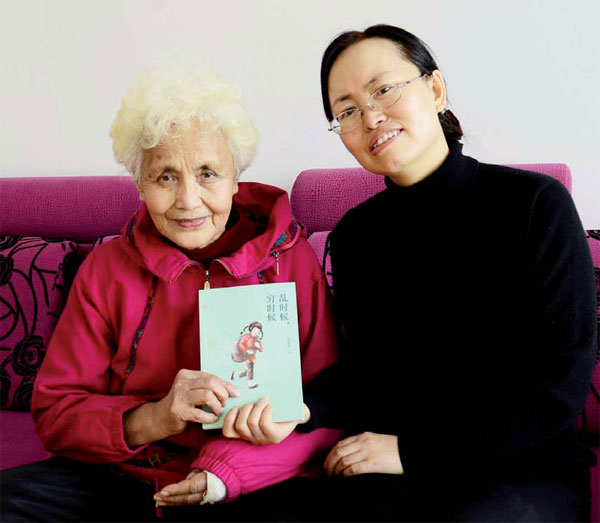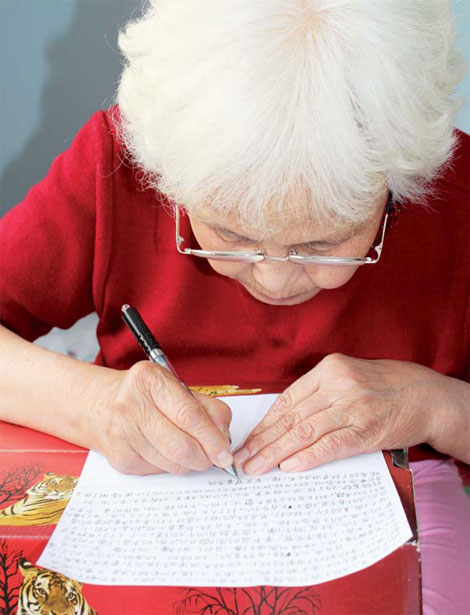Age no bar for learning or writing
Updated: 2014-01-24 08:57
By Sun Ye (China Daily Europe)
|
|||||||||||
|
Jiang Shumei and her daughter Zhang Ailing show off her newly published autobiography, Chaotic Times, Poor Times. Photos Provided to China Daily |
While most people slow down in their 70s, Jiang Shumei has published her first book - an autobiography
Jiang Shumei was illiterate for much of her life. She only started learning to write Chinese characters at 60. Not only did she become proficient enough to read the voluminous 2012 Nobel laureate in literature Mo Yan's collections, she turned to writing at 75 and produced a popular memoir a year later.
The slim, vivacious, silver-haired grandmother, born in Juye, Shandong province in 1937, has recently published Chaotic Times, Poor Times, a 100,000-word nonfiction work with incredible tales from the past century.
Writing the book did not come easily because Jiang only knows a thousand or so characters. But she invented rhyming songs, and simple poetic verses and asked her grandchildren to write them down so that she could memorize the characters. She watched China Central Television's opera channel so she could learn more characters by reading the subtitles.
Eventually, she had the basics of written language so she could write her life story.
She gathered some of the stories from her parents. Like the one about the crude, excruciating penalty for murder and adultery by "lighting the sky lamp". Flesh was dug out of the murderer's or adulterer's shoulders and the wounds filled with oil and a candle wick, lit, and the flame and pain would slowly consume the sinner. It was a practice that continued in Shandong until the 1920s.
She has also illustrated some eventful and emotional experiences in her book.

Jiang had to flee from her hometown during the War of Resistance against Japanese Aggression (1937-45) and War of Liberation (1946-49). While on the run, she witnessed many macaber deaths. She comments: "I didn't know what fear was".
She didn't meet her husband until the moment they registered their marriage. "I told myself, I would take him no matter how he would be," she recalls. He turned out to be "not too bad".
She survived the famine in the early 1960s, often sustaining herself on leaves. "Pagoda leaves are tasteless, mulberry leaves prick, elm tree leaves are the best," she writes. "We stripped elm trees bare one particularly hard year. They all died."
She claims to have been possessed by a weasel when her family first migrated to Northeast China's Heilongjiang province. She was thrown over by an unknown force and thudded headlong on the floor. According to the village lore, the weasel was seeking revenge for its lost lair.
In Heilongjiang, Jiang made a living carrying tiles and selling alkali.
For much of her life, she worked hard for food and shelter. "I remember, for a long time, I had this wish, 'if only I can have maize for food, it would be such bliss'," she says.
When she finally retired, Jiang remained the busy, loving parent, always there to help her grown children. But a car crash changed her life.
When Jiang turned 60, her husband died in an accident. Desperate for distraction, she started learning to read, something she had never learned to do because of the wars and tough daily battle for survival.
"I was at a stage of life where there was no more hope other than waiting for the day to pass," Jiang says. "But my daughter told me, 'it's time you lived for yourself, you should do something you really wanted to do.' And I wanted to read and write and play an electronic keyboard."
Her daughter, Zhang Ailing, is an author herself. She had explained the principles of writing and she proofread Jiang's first drafts.
"It was a headache to read them at first," says Zhang, who teaches news writing at Suihua University, "because her writing has no space, no punctuation marks and is crammed ever so densely".
"But I saw the glitter of really good stories," Zhang says.
"It's my daughter who told me that mine are legendary tales," says Jiang, who is still hale and hearty and adores festive colors.
She suddenly had found something to live for - to become a writer.
Jiang would wake up at 3 am every day and write.
Her writings, often 1,000 characters long, were posted on her daughter's blog, and were soon noticed.
Editor Ma Guoxing discovered her work and helped her publish in Duku magazine, a bimonthly non-fiction publication.
That publication gave Jiang her first royalty of 3,000 yuan ($496). "I was so happy that I couldn't sleep that night. I told my daughter, we don't have to skimp on anything now," Jiang says.
Ma was impressed. "Jiang is a legend. Someone who is very positive, motivated and inspirational, she's been through so much, but when she opens her mouth, a good story comes out."
Xie Xizhang, the literary critic, has called her writing "an example of clean, honest text. Refreshing and different from the excessive and corrupt styles so prevalent nowadays".
Jiang is researching for her second and third books now, visiting her old friends and villagers for tales that would otherwise be buried. "She has a knack for it, getting others to talk. She would chat up even a fellow bus passenger," Zhang says.
Jiang, who turns 77 in February, sums up her birthday wish with these words: "I want to live a happy, healthy life as a writer. I want a new book out each year. I'm not too ambitious. The book doesn't have to be long, but it has to be very good. I want to put the stories from old times on the record."
sunye@chinadaily.com.cn
|
Jiang Shumei, 77, started learning to write Chinese characters at 60, and published her first book last year about her life during the turbulent 20th century. Photos Provided to China Daily |
(China Daily European Weekly 01/24/2014 page28)
Today's Top News
8.8% salary hikes expected for 2014
China turns the tables on gamblers
China takes measures against H7N9
Terrorists behind twin explosions in Xinjiang
2014 diplomatic strategy outlined at Davos
China reports another H10N8 case
Big events in the Sino-French relations
IMF chief warns of risks to recovery
Hot Topics
Lunar probe , China growth forecasts, Emission rules get tougher, China seen through 'colored lens', International board,
Editor's Picks

|

|

|

|

|

|







